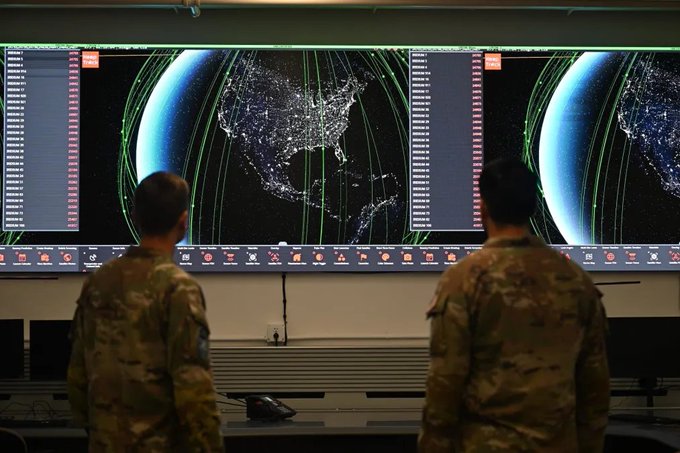
Will Trump’s Space Force send crypto to the moon—or crash it to hell?
- The US Space Force is investing $1B in its R2C2 program to upgrade satellite tech.
- Speculation grows on blockchain’s role in Space Force upgrades, fueled by Trump’s crypto support.
- Blockchain’s secure data management could support CubeSat networks and AI security.
Could President Donald Trump’s enthusiasm for crypto and space converge in a major US Space Force initiative?
The Space Force is investing $1 billion in its Rapid Resilient Command and Control (R2C2) program to modernize satellite technology for orbital warfare, and some in the crypto community are speculating about blockchain’s role.
With Trump’s recent support for cryptocurrencies—such as advocating for a US crypto reserve—and his legacy with the Space Force, could blockchain find a place in the $1 trillion space industry by 2040?
The tweet below sparks speculation, but we’re keeping it objective—Trump’s the focus.
🧵Why Space Force’s R2C2 Program is Bullish for @Conste11ation $DAG The Space Force is making big moves with its Rapid Resilient Command and Control (R2C2) program—think next-gen, cloud-based ground control for satellites. They’re scaling this system for orbital warfare.…
Here’s what we know:
Space Force’s $1B satellite boom
Copy link to sectionThe US Space Force’s R2C2 program is a $1 billion effort to create a fast, cloud-based system for satellites that can maneuver in orbit and counter threats like cyberattacks.
It’s slated to launch its initial version by April 2025, partnering with 20 companies, including Rogue Space Systems, as reported in SpaceNews.
This aligns with projections that the space industry could reach $1 trillion by 2040, driven by satellites and defense, according to Bloomberg.
Trump’s push for the Space Force—starting with his 2018 directive to establish it (video below)—and his recent crypto-friendly policies make this a compelling story.
Could his dual interests pave the way for blockchain in space?
Could blockchain hitch a ride to the stars?
Copy link to sectionRogue Space Systems, an R2C2 contractor, recently launched its Barry-2 CubeSat, equipped with technology from Forward Edge-AI, a firm specializing in AI security for defense.
Forward Edge-AI’s Isidore Quantum® Space Encryptor, scheduled for a March 2025 launch, aims to secure AI in space, as detailed on Rogue’s site.
Notably, Forward Edge-AI collaborates with blockchain projects like Constellation, which uses a Directed Acyclic Graph (DAG) architecture for scalable, secure data processing.
The Constellation Network’s Explorer shows the US Federal Government has already begun utilizing $DAG for data security, hinting at its potential relevance for space applications.
Blockchain’s ability to ensure secure, tamper-proof data could align with Space Force needs, such as managing CubeSat networks or protecting AI from threats.
Other blockchain projects, like SpaceChain, are also exploring space uses.
With Trump’s crypto policies favoring less regulation, some wonder if blockchain could play a role here.
However, this remains speculative, and the connection is unconfirmed.
Trump’s crypto-space dream: moonshot or bust?
Copy link to sectionTrump’s recent moves signal strong support for cryptocurrencies—his January 2025 executive order on digital assets, per Morrison Foerster, and proposals for a US crypto reserve with Bitcoin and Ethereum, per CBS News, show his commitment.
Combined with his Space Force legacy, this raises questions about a potential intersection of crypto and space.
Yet, blockchain faces challenges in space: competition from tech giants, regulatory hurdles, and the untested nature of crypto in defense, as noted in C4ISRNET.
The $1 trillion space industry by 2040, per Morgan Stanley, is a massive opportunity, but blockchain’s role is far from certain.
Crypto investors: ready for liftoff?
Copy link to sectionIf blockchain secures a spot in space, projects with security features—like Constellation ($DAG), currently trading at $0.03774 with a $134 million market cap on Coinbase—could see gains.
But other cryptos with Trump’s stamp of approval, such as Dogecoin (DOGE)—which Trump has praised, and has even already worked with SpaceX for private missions—or Bitcoin (BTC), could also ride this wave if the Space Force adopts blockchain for payments or tech.
However, crypto’s volatility means investors should approach cautiously.
The Trump-Space Force-crypto link is speculative and risky, but it’s worth watching.
Monitor R2C2’s progress and Trump’s crypto policies—blockchain’s space journey could be on the horizon.
This tweet’s optimism is noted, but we’re sticking to facts—Trump’s narrative drives the story.
The $1T Space-crypto frontier: what’s next for Trump’s vision?
Copy link to sectionThe space industry’s $1 trillion target by 2040, per Citi, looms as a tantalizing prize for crypto.
With Trump’s crypto ambitions and the Space Force’s bold plans, blockchain’s potential to secure satellites or power space tech hangs in the balance—a high-stakes gamble that could redefine both industries.
Will Trump’s vision ignite a new era for Dogecoin, Bitcoin, Constellation, and beyond, or will this cosmic dream fade into the void?
Only time will tell.
More industry news








